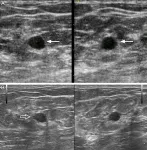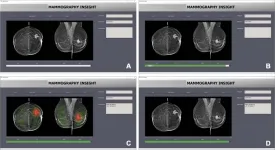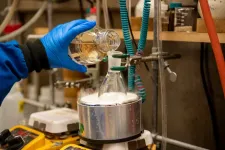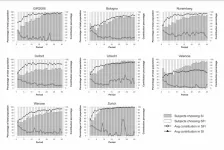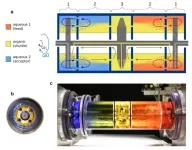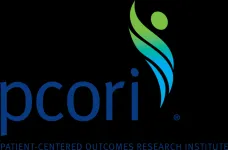(Press-News.org) Scientists have developed two new drug candidates for potentially treating addiction and depression, modeled on the pharmacology of a traditional African psychedelic plant medicine called ibogaine. At very low doses, these new compounds were able to blunt symptoms of both conditions in mice.
The findings, published on May 2 in Cell, took inspiration from ibogaine’s impact on the serotonin transporter (SERT), which is also the target of SSRI antidepressants like fluoxetine (Prozac). A team of scientists from UCSF, Yale and Duke universities virtually screened 200 million molecular structures to find ones that blocked SERT in the same way as ibogaine.
“Some people swear by ibogaine for treating addiction, but it isn’t a very good drug. It has bad side effects, and it’s not approved for use in the U.S.,” said Brian Shoichet, PhD, co-senior author and professor in the UCSF School of Pharmacy. “Our compounds mimic just one of ibogaine’s many pharmacological effects, and still replicate its most desirable effects on behavior, at least in mice.”
Dozens of scientists from the laboratories of Shoichet, Allan Basbaum, PhD, and Aashish Manglik, MD, PhD, (UCSF); Gary Rudnick, PhD, (Yale); and Bill Wetsel, PhD, (Duke) helped demonstrate the real-world promise of these novel molecules, which were initially identified using Shoichet’s computational docking methods.
Docking involves systematically testing virtual chemical structures for binding with a protein, enabling scientists to identify new drug leads without having to synthesize them in the lab.
“This kind of project begins with visualizing what kinds of molecules will fit into a protein, docking the library, optimizing, and then relying on a team to show the molecules work,” said Isha Singh, PhD, a co-first author of the paper who did the work as a postdoc in Shoichet’s lab. “Now we know there’s a lot of untapped therapeutic potential in targeting SERT.”
Ibogaine is found in the roots of the iboga plant, which is native to central Africa, and has been used for millennia during shamanistic rituals. In the 19th and 20th centuries, doctors in Europe and the U.S. experimented with its use in treating a variety of ailments, but the drug never gained widespread acceptance and was ultimately made illegal in many countries.
Part of the problem, Shoichet explained, is that ibogaine interferes with many aspects of human biology.
“Ibogaine binds to hERG, which can cause heart arrhythmias, and from a scientific standpoint, it’s a ‘dirty’ drug, binding to lots of targets beyond SERT,” Shoichet said. “Before this experiment, we didn’t even know if the benefits of ibogaine came from its binding to SERT.”
Shoichet, who has used docking on brain receptors to identify drugs to treat depression and pain, became interested in SERT and ibogaine after Rudnick, an expert on SERT at Yale, spent a sabbatical in his lab. Singh picked up the project in 2018, hoping to turn the buzz around ibogaine into a better understanding of SERT.
It was the Shoichet lab’s first docking experiment on a transporter—a protein that moves molecules into and out of cells—rather than a receptor. One round of docking whittled the virtual library from 200 million to just 49 molecules, 36 of which could be synthesized. Rudnick’s lab tested them and found that 13 inhibited SERT.
The team then held virtual-reality-guided “docking parties,” to help Singh prioritize five molecules for optimization. The two most potent SERT inhibitors were shared with Basbaum and Wetsel’s teams for rigorous testing on animal models of addiction, depression, and anxiety.
“All of a sudden, they popped—that's when these drugs looked a lot more potent than even paroxetine [Paxil],” Shoichet said.
Manglik, an expert with cryo-electron microscopy (cryo-EM), confirmed that one of the two drugs, dubbed ‘8090, fit into SERT at the atomic level in a way that closely resembled Singh and Shoichet’s computational predictions. The drugs inhibited SERT in a similar way to ibogaine, but unlike the psychedelic, their effect was potent and selective, with no spillover impacts on a panel of hundreds of other receptors and transporters.
“With this sort of potency, we hope to have a better therapeutic window without side effects,” Basbaum said. “Dropping the dose almost 200-fold could make a big difference for patients.
Shoichet has submitted the structures of both new molecules to Sigma Aldrich, the chemical manufacturing company, aiming to make the them available for further testing by other scientists, while he continues to hunt for more precise molecules
With millions of patients continuing to suffer from depression or addiction, new prospective therapies are needed.
“This is really the way science should be done,” Basbaum said. “We took a group with expertise in disparate fields and came up with something that might really make a difference.”
END
Ibogaine inspires new compounds to treat addiction, depression
Targeted molecules are more powerful than SSRI antidepressants and avoid ibogaine’s dangerous side effects
2023-05-02
ELSE PRESS RELEASES FROM THIS DATE:
AI helpful in triaging breast masses in low-resource areas
2023-05-02
OAK BROOK, Ill. – Artificial intelligence (AI) can analyze breast mass images from low-cost portable ultrasound machines and accurately identify cancer, according to a study published in Radiology, a journal of the Radiological Society of North America (RSNA). This could prove useful for triage in low-resource settings.
Breast lumps are often found accidentally, during breast self-exam or during a breast exam by a medical professional. Breast cancer screening can find cancers in the breast before the lump can be felt.
While cancer screening has been the focus in Western countries, low- and middle-income ...
AI bias may impair radiologist accuracy on mammogram
2023-05-02
OAK BROOK, Ill. – Incorrect advice by an AI-based decision support system could seriously impair the performance of radiologists at every level of expertise when reading mammograms, according to a new study published in Radiology, a journal of the Radiological Society of North America (RSNA).
Often touted as a “second set of eyes” for radiologists, AI-based mammographic support systems are one of the most promising applications for AI in radiology. As the technology expands, there are concerns that it may make radiologists susceptible to automation bias—the tendency of humans ...
Machine translation for cuneiform tablets
2023-05-02
An AI model has been developed to automatically translate Akkadian text written in cuneiform into English. Hundreds of thousands of clay tablets from ancient Mesopotamia, written in cuneiform and dating back as far as 3,400 BCE, have been found by archeologists, far more than could easily be translated by the limited number of experts who can read them. Shai Gordin and colleagues present a new machine learning model that can automatically translate Akkadian cuneiform into English. Two versions of the model were trained. One version translates the Akkadian from representations of the cuneiform signs in Latin ...
Climate reasoning, prior beliefs, and partisanship
2023-05-02
A popular explanation for climate denialism is that humans will adopt beliefs that accord with their political orientation, using their cognitive abilities to explain away identity-inconsistent information in a process called “motivated reasoning.” To test this hypothesis, Bence Bago and colleagues challenged volunteers’ ability to think rationally using time pressure and cognitive loads of varying intensity. The team recruited American participants from Lucid, a website that connects academics with online survey participant pools. The authors found that people who had the ability to deliberate free of cognitive load or time ...
SwRI, UTSA researchers develop new method to synthesize antimalarial drug
2023-05-02
SAN ANTONIO – May 2, 2023 - Southwest Research Institute (SwRI) and The University of Texas at San Antonio (UTSA) have developed a method to synthesize the highly potent antimalarial drug artemisinin, which could lead to a more cost-effective treatment for malaria. The work, recently featured on the cover of the scientific journal Organic Letters, was supported by the Bill and Melinda Gates Foundation as well as a grant from the Connecting through Research Partnerships (Connect) program, a joint effort by SwRI and UTSA to enhance scientific collaboration between the two institutions.
In 2021, 247 million cases of malaria led to 619,000 deaths worldwide. The most effective ...
ASBMB calls for better wages and benefits for postdocs
2023-05-02
The American Society for Biochemistry and Molecular Biology sent recommendations to the National Institutes of Health on April 14 to improve working conditions for postdocs.
The society recommended that the NIH:
Ensure a livable wage, benefits, etc. for postdocs
Require that principle investigators help postdocs craft a training plan
Require that principal investigators complete mentor training programs
Expand programs to create more academic staff scientist positions
Collect data on postdoc career outcomes
“Many of our members who run labs are struggling to recruit and retain qualified postdocs,” Sarina Neote, public affairs director ...
Cooperation benefits from peer-punishment
2023-05-02
A multi-lab replication of a 2006 study supports the role of peer sanction in promoting human cooperation. Cooperation is imperative for society to successfully solve complex problems, including climate change. One approach many groups have adopted is a system of peer sanctions for noncooperators. Such a system incurs costs to participants, who must impose the sanctions, but can allow cooperators to feel more secure that their investments in the shared project will be matched by others. A 2006 study suggested that groups with peer sanctions outgrew and outperformed groups without a peer-sanctioning institution. In light ...
Recycling of valuable metals from spent lithium ion batteries using spinning reactors
2023-05-02
In a world that is slowly distancing itself from carbon-based energy, there has been a meteoric rise in the use of lithium-ion batteries as a next-generation energy storage solution. However, this has resulted in another problem - an increase in the amount of lithium battery waste. Lithium-ion batteries degrade slowly over their lifetime, losing anywhere from 12% to 24% of their total capacity over 500 charging and discharging cycles. The electrolyte and other materials inside the battery can also degrade, causing a decrease in capacity over time. The disposal of lithium batteries ...
PCORI offers up to $452 million through new health research funding opportunities on high-priority topics
2023-05-02
WASHINGTON, D.C. – The Patient-Centered Outcomes Research Institute (PCORI) today began inviting proposals for new studies and implementation projects through nine funding opportunities. These PCORI Funding Announcements (PFAs) include four offering up to $452 million for comparative clinical effectiveness research (CER) studies comparing health care approaches to help patients and their caregivers make better-informed health choices given their particular circumstances. Additional PFAs offer funding for a range of projects that support and advance patient-centered CER and use of PCORI-funded research results.
“With ...
Could wearables capture well-being?
2023-05-02
New York, NY (May 2, 2023)—Applying machine learning models, a type of artificial intelligence (AI), to data collected passively from wearable devices can identify a patient’s degree of resilience and well-being, according to investigators at the Icahn School of Medicine at Mount Sinai in New York.
The findings, reported in the May 2nd issue of JAMIA Open, support wearable devices, such as the Apple Watch®, as a way to monitor and assess psychological states remotely without requiring the completion of mental health questionnaires.
The ...
LAST 30 PRESS RELEASES:
Kidney cancer study finds belzutifan plus pembrolizumab post-surgery helps patients at high risk for relapse stay cancer-free longer
Alkali cation effects in electrochemical carbon dioxide reduction
Test platforms for charging wireless cars now fit on a bench
$3 million NIH grant funds national study of Medicare Advantage’s benefit expansion into social supports
Amplified Sciences achieves CAP accreditation for cutting-edge diagnostic lab
Fred Hutch announces 12 recipients of the annual Harold M. Weintraub Graduate Student Award
Native forest litter helps rebuild soil life in post-mining landscapes
Mountain soils in arid regions may emit more greenhouse gas as climate shifts, new study finds
Pairing biochar with other soil amendments could unlock stronger gains in soil health
Why do we get a skip in our step when we’re happy? Thank dopamine
UC Irvine scientists uncover cellular mechanism behind muscle repair
Platform to map living brain noninvasively takes next big step
Stress-testing the Cascadia Subduction Zone reveals variability that could impact how earthquakes spread
We may be underestimating the true carbon cost of northern wildfires
Blood test predicts which bladder cancer patients may safely skip surgery
Kennesaw State's Vijay Anand honored as National Academy of Inventors Senior Member
Recovery from whaling reveals the role of age in Humpback reproduction
Can the canny tick help prevent disease like MS and cancer?
Newcomer children show lower rates of emergency department use for non‑urgent conditions, study finds
Cognitive and neuropsychiatric function in former American football players
From trash to climate tech: rubber gloves find new life as carbon capturers materials
A step towards needed treatments for hantaviruses in new molecular map
Boys are more motivated, while girls are more compassionate?
Study identifies opposing roles for IL6 and IL6R in long-term mortality
AI accurately spots medical disorder from privacy-conscious hand images
Transient Pauli blocking for broadband ultrafast optical switching
Political polarization can spur CO2 emissions, stymie climate action
Researchers develop new strategy for improving inverted perovskite solar cells
Yes! The role of YAP and CTGF as potential therapeutic targets for preventing severe liver disease
Pancreatic cancer may begin hiding from the immune system earlier than we thought
[Press-News.org] Ibogaine inspires new compounds to treat addiction, depressionTargeted molecules are more powerful than SSRI antidepressants and avoid ibogaine’s dangerous side effects
